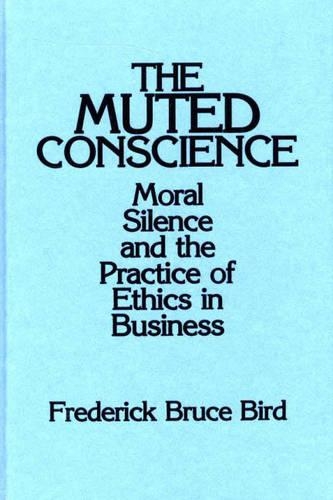
The Muted Conscience: Moral Silence and the Practice of Ethics in Business
(Hardback)
Available Formats
Publishing Details
The Muted Conscience: Moral Silence and the Practice of Ethics in Business
By (Author) Frederick B. Bird
Bloomsbury Publishing PLC
Praeger Publishers Inc
9th December 1996
United States
Classifications
Tertiary Education
Non Fiction
174.4
Physical Properties
Hardback
280
Description
It's not that most businesspeople lack moral convictions. Rather, they tend not to voice them and are inattentive when others do. Dr. Bird sees this behavior as moral silence, deafness, and blindness, and, following this analogy to the senses, he argues that the practice of ethics is a form of communication. Thus, instead of focusing on specific moral issues, Dr. Bird examines the things that stifle communication about moral issuesfactors that have a costly impact on business. His book presents a new view of ethics, in which ethics can be construed as a practical social activity, not a utopian concept to be contemplated in the abstract. With numerous examples and case studies from business life and a logical, sensible analysis of what causes moral silence, deafness, and blindness, Dr. Bird's book will be challenging reading not only for professionals and academics in various fields of business, but also for their colleagues in philosophy, religion, and the social sciences. The author begins by discussing the nature of moral silence in contemporary business and asks what kind of problem it is. He examines what it means to voice or not voice moral convictions and what it means to be inattentive or deaf to moral issues. He continues the analogy into moral blindnessthe problem of not perceiving moral issues clearly. From there he explores the consequences of moral silence, deafness, and blindness and traces their causes to a variety of cultural, individual, and organizational factors, all of them interconnected. The book concludes with a way in which businesspeople and others can understand ethics as a social activity in which everyone can and must participate. Dr. Bird sees the practice of ethics as a form of conversation, a way in which people establish and maintain agreements among themselves, and in doing so help each other overcome their sensory incapacitations. Dr. Bird provides ways in which this can be done, from the use of workshops on interpersonal skills to seminars on conflict resolutiontools and aids that are already prevalent in organizations but that have not, until now, been seen as facilitators of moral awareness and action.
Reviews
Bird's book is a wake-up call to the dormant conscience of businesspeople and their organizations...Bird's bold attempt in redefining the normative principles of moral communication transforms business ethics beyond its traditional laxity and timidity into the domain of real conscious integration. This book will be challenging reading for those who are genuinely interested in the exploration of a new frontier of individual and organizational axiology.-Journal of Religion and Culture
"Bird's book is a wake-up call to the dormant conscience of businesspeople and their organizations...Bird's bold attempt in redefining the normative principles of moral communication transforms business ethics beyond its traditional laxity and timidity into the domain of real conscious integration. This book will be challenging reading for those who are genuinely interested in the exploration of a new frontier of individual and organizational axiology."-Journal of Religion and Culture
Author Bio
FREDERICK BRUCE BIRD is Professor of Comparative Ethics at Concordia University, Montreal, where he teaches in both the management and religion departments and directs the doctoral program in religion./e He holds advanced degrees from Harvard Divinity School and the Graduate Theological Union and has authored or coauthored several previous books on management, business, and ethics.
